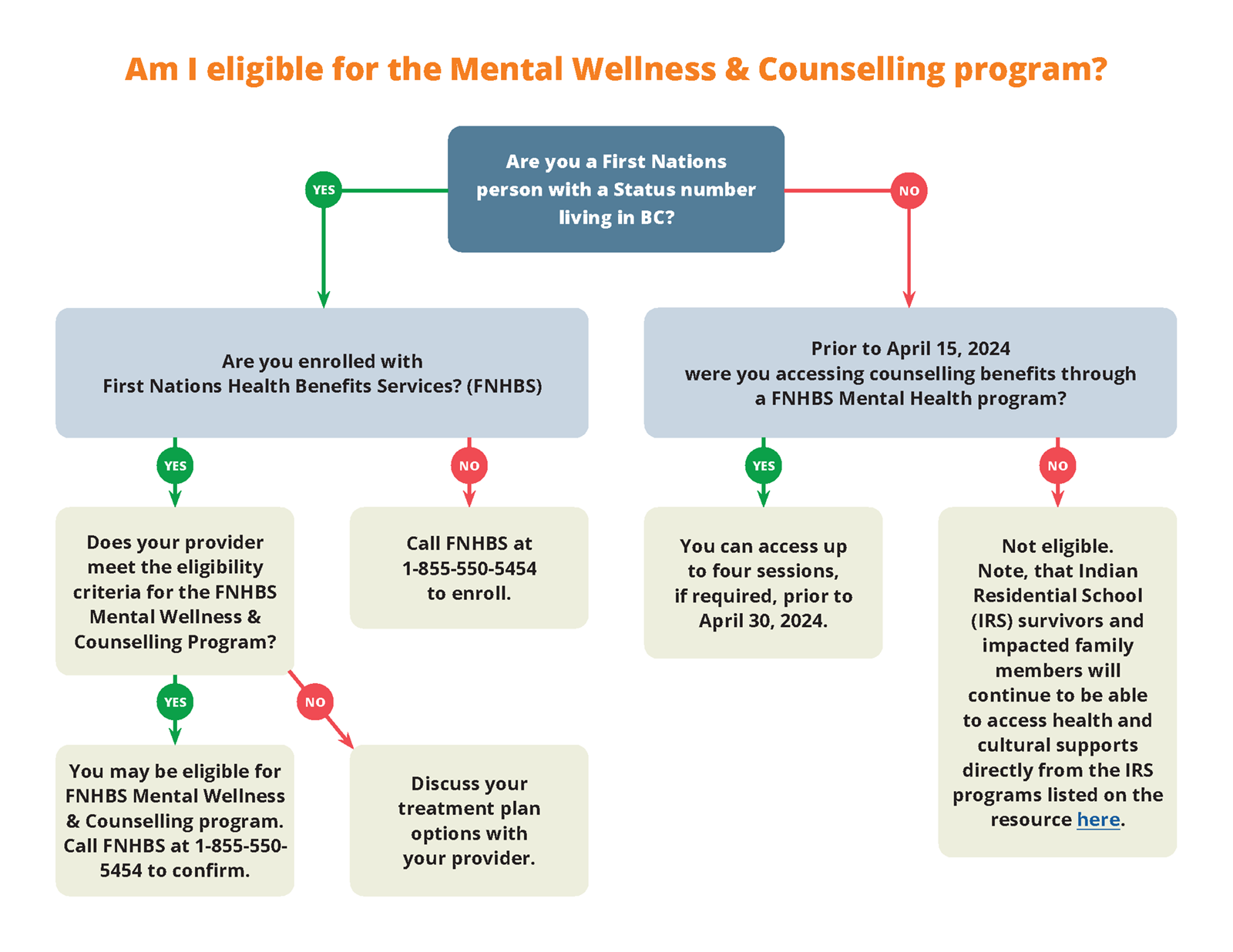The First Nations Health Authority (FNHA) works closely with funding partners and community to carefully evaluate the sustainability and cultural safety of First Nations Health B enefits and Services (FNHBS) programs for Clients. As a result of this review, there have been several updates to the Mental Health programs and services, effective April 15, 2024.
What are the changes?
- Mental Health program eligibility. Mental Health programs and services will now have the same eligibility as all other FNHBS programs. These services will be available for Status First Nations who meet the Medical Service Plan definition of residency in BC (three months). For more information about eligibility and enrolling with FNHBS, click the link here.
- Mental Wellness & Counselling program. FNHBS will serve Clients under one program. This includes the following programs: Mental Wellness Counselling program, the Indian Residential School Resolution Health Support Program (IRS RHSP), Missing and Murdered Indigenous Women and Girls Health Support Services (MMIWG HSS) and the Indian Day School Health Support Services (IDS HSS).
- Mental Health Provider eligibility. In addition to existing Provider eligibility, new Providers must have a minimum of five years' counselling experience and a minimum of three years' counselling experience serving First Nations people.
Why is the FNHA making these changes?
The Indian Residential Schools Settlement Agreement concluded on March 31, 2021. At that time the FNHA no longer had access to the registry of those entitled to receive benefits related to their attendance at Indian Residential School (IRS). This resulted in an inability to verify IRS counselling eligibility and led to a corresponding increase in Clients and subsequent costs.
After a review of current program usage and available funding, a decision was made to align MWC eligibility with the rest of the FNHBS' eligibility criteria. First Nations people living in BC with Status are eligible for FNHBS coverage under the FNHA's funding agreement with Canada. The FNHA continues to work closely with funding partners and community programs to support IRS Survivors and their family members across BC.

I'm seeing a counsellor right now, but I'm not a Status First Nation. What do I do after April 15, 2024?
Coverage is available until April 30, 2024. If you do not meet the new Mental Wellness Counselling program Client eligibility criteria, coverage is available for up to 4 hours prior to April 30, 2024. For additional mental health resources, please click the link here. If you need any support to navigate the FNHA-funded health and cultural supports please email us at MHWPrograms@fnha.ca.
I'm an Indigenous person but not a First Nations person with Status. Can I still register as a new Client to receive up to four session during the month of April 2024?
Only First Nations people with Status and live in BC will be eligible to register for counselling services effective immediately.
I have a Métis Membership number, is that considered Status under the new eligibility requirements effective April 15, 2024?
A Métis membership number does not meet the eligibility criteria for the Mental Wellness and Counselling program. The Mental Wellness and Counselling eligibility requires that Clients have a Status number as defined by the Indian Act. You can learn more about registering for Status here.
For further information about Client eligibility, please visit the Health Benefits website.
I am an Indian Residential School (IRS) Survivor without Status. My family and I were accessing counselling services through FNHBS before, am I eligible after April 15, 2024?
Effective immediately only First Nations Clients with Status will be eligible for the Mental Wellness and Counselling program. Additional FNHA-funded supports are available to IRS Survivors and family members. You can find the supports at the link here.
How does FNHA's mental wellness counselling program compare with Non-insured Health Benefits (NIHB) eligibility and coverage for First Nations people in other provinces and territories?
The NIHB program provides coverage to First Nations people who are registered under the Indian Act, c ommonly referred to as a “Status Indian". Every 12 months an eligible Client can receive up to 22 hours of counselling performed by an eligible Provider. Additional hours in the same 12 month period may be provided on a case by case basis.
I still have other questions, who do I contact?
If you have any other questions please contact the relevant resource below.
FNHA contacts
FNHBS phone: 1-855-550-5454
Email: mhproviderreg@fnha.ca
Regional health authority mental health support contact
The following regional health authority supports are available to all BC residents.
Fraser Health
Phone: 1-866-766-6960
Wesbite: https://www.fraserhealth.ca/health-topics-a-to-z/indigenous-health/indigenous-mental-health-and-wellness
Interior Health Region
Phone: 310-MHSU (6478)
Website: https://www.interiorhealth.ca/health-and-wellness/mental-health-and-substance-use/mental-health/adult-mental-health-services-and-resources
Island Health
Phone: 1-888-885-8824
Website: https://www.islandhealth.ca/our-services/mental-health-substance-use-services
Northern Health
Phone: 310-6789
Website: https://www.northernhealth.ca/services/mental-health-substance-use/get-help-now
Vancouver Coastal
Phone: 8-1-1
Website: https://www.vch.ca/en/health-topics/mental-health-substance-use
A Mental Wellness and Counselling frequently asked resource for Providers is available here.
Resources
24 Hour mental health supports:
Hope for Wellness Help Line offers immediate mental health counselling and crisis intervention by phone or online chat. Call toll-free 1-855-242-3310 or start a confidential chat with a counsellor at hopeforwellness.ca.
Indian Residential School Crisis Line is a national service for anyone experiencing pain or distress as a result of their residential school experience. Call toll-free 1-866-925-4419.
KUU-US Crisis Line Society provides crisis services for Indigenous people across BC. Adults/Elders line 250-723-4050; youth line 250-723-2040. Or call toll free 1-800-588-8717. Learn more at www.kuu-uscrisisline.com.
Métis Crisis Line is a service of Métis Nation British Columbia. Call 1-833-MétisBC (1-833-638-4722).
For a full list of mental health and wellness supports, please visit the link here.

